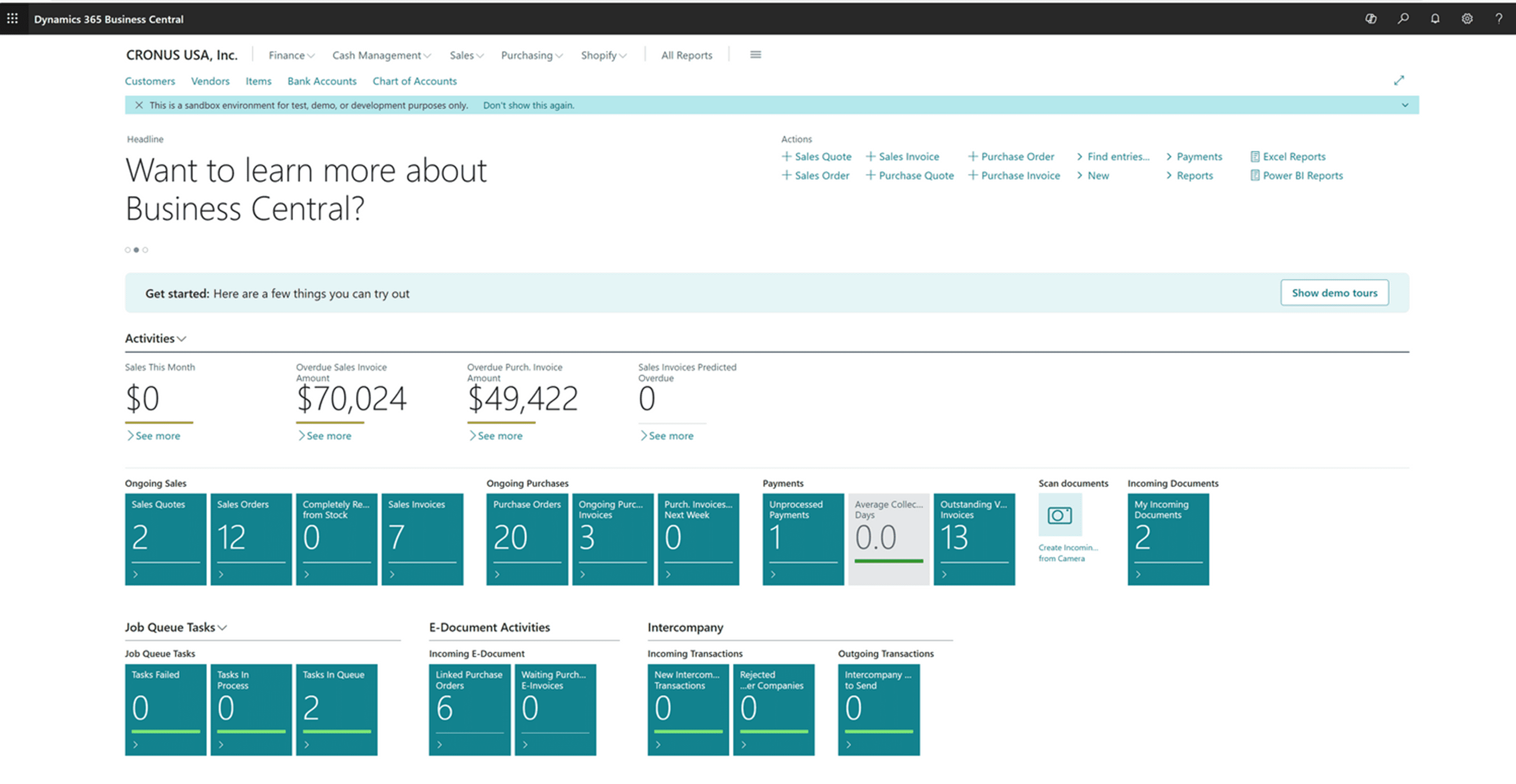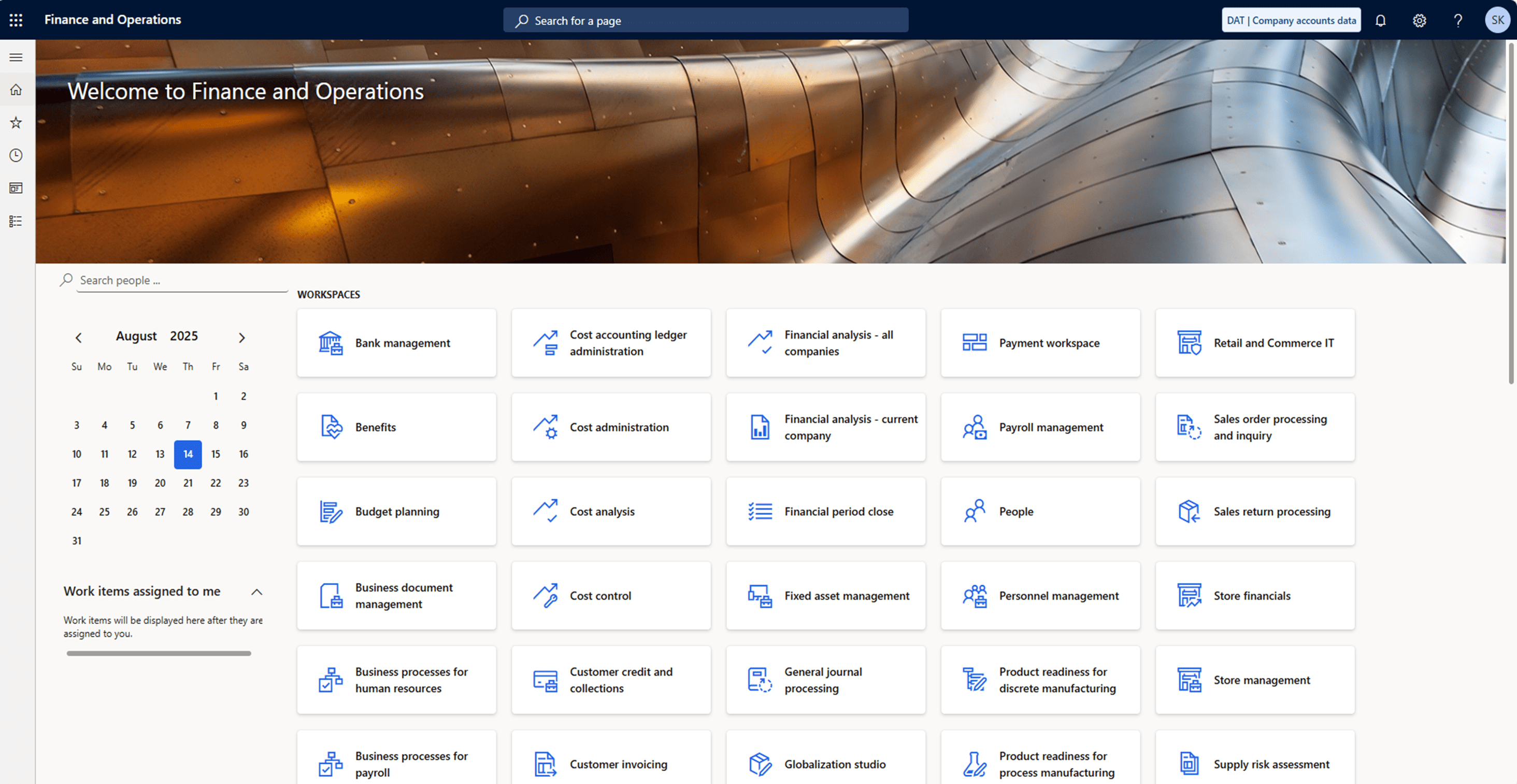Choosing between Microsoft Dynamics 365 Business Central and Dynamics 365 Finance & Supply Chain Management (formerly Finance and Operations) can be challenging, especially for businesses comparing ERP software for small business and enterprise-level solutions. Both are powerful Microsoft ERP systems, but each is designed for different business needs. Many organizations first ask, “What is the difference between Dynamics 365 and Business Central?” This guide breaks it down for you.
In Part 1 of our Microsoft ERP comparison series, we explore Business Central vs Finance and Supply Chain Management, focusing on financial differences such as usability, global consolidation, and compliance features that shape how your organization manages growth, reporting, and control.
Watch our in-depth Microsoft Dynamics ERP comparison for a full walkthrough of both systems.
What Is the Difference Between Dynamics 365 and Business Central?
At a high level, the difference between Dynamics 365 and Business Central lies in business scale, feature depth, and global capabilities. Business Central serves small and midsized businesses, while Dynamics 365 Finance & Supply Chain Management is built for large, complex enterprises.
User Interface and Experience
When evaluating ERP systems, usability plays a major role in adoption and productivity. Microsoft designed both Dynamics 365 Business Central and Dynamics 365 Finance & Supply Chain Management (F&SCM) with modern, cloud-based interfaces, but each caters to a different level of business complexity and user expectation.
Business Central is intuitive and user-friendly, making it ideal for small and midsized businesses. Its clean interface features clear menus, role-based dashboards, and search-driven navigation. Users can personalize their workspace, pin frequently used reports and integrate seamlessly with familiar Microsoft 365 tools like Excel and Outlook. These capabilities are among the most popular Dynamics 365 Business Central features, making Business Central one of the most flexible ERP software for small business options available today. Business Central also meets the needs of medium-sized organizations that are starting to handle more complex operations. It provides the functionality and integrations they need as they grow, supporting a smooth transition from simple accounting systems to a more advanced ERP environment.

In contrast, Finance & Supply Chain Management provides an enterprise-grade interface tailored for organizations managing multiple departments, locations, or entities. F&SCM uses workspaces that are designed for specific business functions such as finance, procurement, or production. Compared to Business Central, the interface is more data-driven and information-dense, providing a classic, professional layout that prioritizes precision and depth.

Business Central offers simplicity – Finance & SCM delivers control
Which businesses should use Dynamics 365 Business Central?
Business Central is ideal for small and midsized businesses that want a straightforward ERP system that prioritizes ease of use and quick implementation. It serves as a reliable ERP for small businesses, delivering all the essential ERP capabilities in a clean, accessible environment that helps teams get up and running quickly. At the same time, Business Central scales effectively for medium-sized companies, offering the flexibility and depth needed to manage expanding operations, additional users, and more complex financial processes.
Which businesses should use Dynamics 365 Finance & Supply Chain Management?
Finance & Supply Chain Management is designed as a powerful ERP for large enterprise operations that manage multiple entities, locations, or product lines. It delivers deeper functionality, advanced automation, and the scalability needed to support global operations with complex financial, compliance, and supply chain requirements.
Business Central vs. Finance & Supply Chain Management: What’s the real difference?
The real difference between Business Central and Finance & Supply Chain Management often comes down to the depth of functionality your operations and supply chain require. Business Central can handle a wide range of business needs but reaching that same level of depth may require additional customization or ISV extensions to support advanced scenarios. Finance & Supply Chain Management includes most of these capabilities natively, making it better suited for organizations with complex, multi-layer operations that need everything to work seamlessly from the start.
Summary: Business Central focuses on ease of use and quick adoption for growing businesses, while Finance & Supply Chain Management delivers deeper functionality and control for large, complex organizations.
Global Consolidation Capabilities
Global consolidation is important for companies that operate in more than one country or manage multiple subsidiaries. It combines financial data from different entities into a single, accurate view, giving a clear picture of overall financial health.
Dynamics 365 Finance & Supply Chain Management (F&SCM) offers deeper functionality for large and complex enterprises. As a powerful ERP for global operations, it supports automated elimination rules, ownership-based consolidation, multiple consolidation hierarchies, and full audit trails, all designed to handle diverse corporate structures and currencies. It also includes built-in compliance with IFRS and GAAP, along with automated scheduling and intercompany automation. Recognized as one of the leading multi entity financial consolidation ERP software solutions, F&SCM is ideal for global organizations that need centralized control over multiple subsidiaries and reporting requirements.
Both Business Central and Finance & Supply Chain Management perform well when consolidating a few local subsidiaries within the same country. For simple setups such as two or three domestic entities, either system can deliver accurate results efficiently. However, the difference becomes clear in more complex environments, such as when a company needs to consolidate a dozen global entities that each use different charts of accounts, currencies, and ownership structures.
In these situations, Business Central can still handle the process, but it usually requires more manual configuration and custom setup. Finance & Supply Chain Management, on the other hand, automates much of the work and provides greater speed, accuracy, and compliance across all entities.
That said, Business Central remains an excellent choice for small to midsized businesses with straightforward financial structures. It delivers a user-friendly experience with tools for basic intercompany automation, manual eliminations, and currency revaluation. For organizations that don’t require the complexity of a multi entity ERP system, Business Central offers a practical and cost-effective way to manage financial consolidation efficiently.
Comparison of Global Consolidation Capabilities in Business Central and Finance & Supply Chain Management
| Feature | Business Central | Dynamics 365 Finance |
| Advanced Elimination Rules | ✅ Manual or limited | ✅ Automated, rule-based |
| Ownership % Consolidation | ❌ Not supported | ✅ Yes (e.g., 60% owned subsidiary) |
| Multiple Consolidation Trees | ❌ Not supported | ✅ Yes |
| Cross-Company Dimensions | ❌ Limited | ✅ Fully supported |
| Audit Trail | ✅ Basic | ✅ Full drill-down |
| Regulatory Compliance | ✅ Manual | ✅ Built-in support |
| Automated Scheduling | ✅ Manual process | ✅ Scheduled jobs |
| Intercompany Automation | ✅ Basic | ✅ Advanced (shared services) |
Business Central handles basic multi-company needs, while Finance & Supply Chain Management manages complex global consolidations.
Summary: Business Central supports basic multi-company consolidation for smaller organizations, whereas Finance & Supply Chain Management provides advanced automation and compliance tools ideal for global enterprises managing multiple entities.
Compliance and Regulatory Features
Compliance is one of the most critical aspects of any financial system, particularly for organizations that operate across multiple regions and industries. It goes beyond meeting accounting standards. It ensures transparency, security, and trust in every financial process. Below, we explore how Dynamics 365 Business Central and Dynamics 365 Finance & Supply Chain Management (F&SCM) address key areas of Dynamics 365 compliance, including regulatory standards, localization and tax requirements, security, data governance, and workflow control.
Regulatory Compliance
When it comes to regulatory compliance, Dynamics 365 Finance & Supply Chain Management offers significantly more advanced functionality than Business Central.
Business Central provides manual setup options for IFRS and GAAP standards, which are sufficient for small to midsized organizations with straightforward reporting needs. It includes a basic audit trail that allows users to track changes and maintain a simple record of financial activities.
Dynamics 365 Finance & Supply Chain Management, on the other hand, includes built-in support for multiple financial reporting standards and is designed for enterprises that operate across different jurisdictions. It offers full audit logs, traceability, and segregation of duties, ensuring compliance with regulations such as SOX, IFRS, and GAAP. These capabilities are essential for maintaining accountability and transparency across global operations.
Benefit: Business Central simplifies compliance for SMBs, while Finance & Supply Chain Management automates complex audit and reporting needs for global enterprises.
Localization and Tax Compliance
For organizations that operate internationally, global tax compliance and localization are equally important. Managing taxes across multiple jurisdictions requires flexible ERP systems that adapt to evolving regulations.
Business Central supports localizations for around 20 countries, which works well for companies with regional operations. It offers a basic VAT and GST calculation engine suitable for standard tax environments, though electronic invoicing and digital reporting often require third-party solutions.
Dynamics 365 Finance & Supply Chain Management expands these capabilities with support for more than 40 countries, providing detailed localizations that address country-specific tax, accounting, and reporting rules. It simplifies global tax compliance through an advanced, configurable tax engine that can handle complex requirements such as India’s GST or Brazil’s NF-e.
Benefit: Business Central supports basic VAT and GST, while Finance & Supply Chain Management handles advanced global tax compliance.
Security and Data Governance
Security and data integrity are at the heart of Dynamics 365 compliance. Both Business Central and Finance & Supply Chain Management offer role-based access control, but the depth of these features differs. Business Central provides standard role permissions suitable for smaller teams, while Finance offers fine-grained access control with detailed audit logs and user activity tracking.
In terms of data residency and sovereignty, Business Central offers limited configuration, while Finance & SCM leverages Microsoft Azure’s enterprise-grade infrastructure to ensure compliance with global standards such as GDPR and HIPAA. This makes Finance & SCM a stronger choice for organizations in regulated industries seeking advanced Dynamics 365 security and compliance capabilities.
Segregation of Duties (SoD) is another key differentiator. In Business Central, SoD controls must be managed manually. Dynamics 365 F&SCM, however, includes built-in SoD rules and automated conflict detection to prevent unauthorized activities and maintain proper approval hierarchies.
Benefit: Business Central offers standard data security, while Finance & Supply Chain Management adds enterprise-level control and compliance.
To learn more about building a strong security foundation within your ERP environment, read our article on ERP Security Framework: Protect Your Sensitive Data.
Workflow and Approval Controls
Both systems provide workflow management capabilities, but the level of control and automation differs.
Business Central includes basic approval workflows for processes such as accounts payable, accounts receivable, and journal entries. These are sufficient for small organizations that need simple oversight.
Finance & Supply Chain Management offers multi-level, configurable workflows with audit trails, escalation paths, and conditional logic. This ensures consistent policy enforcement and internal control compliance across complex financial processes.
Benefit: Business Central manages simple approvals, while Finance & Supply Chain Management supports complex, automated workflows for large enterprises.
Summary of Compliance Capabilities in Business Central vs Finance & Supply Chain Management
| Compliance Area | Business Central | Dynamics 365 Finance |
| Global Tax & Localization | ⚠️ Limited | ✅ Extensive |
| Financial Standards (IFRS/GAAP) | ⚠️ Manual | ✅ Built-in |
| Audit & Security | ⚠️ Basic | ✅ Enterprise-grade |
| Regulatory Reporting | ⚠️ Manual | ✅ Automated & Localized |
Dynamics 365 Finance & SCM provides deeper compliance coverage, global tax compliance automation, and audit readiness for multinational enterprises, while Business Central offers simplicity and efficiency for organizations with less complex compliance needs.
Summary: Business Central offers essential compliance and reporting features for SMBs, while Dynamics 365 Finance & Supply Chain Management provides a complete enterprise-grade framework for global standards, localization, and data governance.
Making the Right Choice
Choosing the right ERP depends on your organization’s size, structure, and operational complexity. The table below highlights how Dynamics 365 Business Central and Dynamics 365 Finance & Supply Chain Management (F&SCM) differ across key areas such as deployment, compliance, and scalability.
Quick Comparison: Business Central vs Dynamics 365 Finance & SCM
The table below provides a side-by-side comparison of Dynamics 365 Business Central vs Dynamics 365 Finance and Supply Chain Management (F&SCM). It highlights how Dynamics 365 Business Central features differ from Dynamics 365 Supply Chain Management features, helping you identify which ERP solution is the best fit for your business.
| Feature | Dynamics 365 Business Central | Dynamics 365 Finance & Supply Chain Management |
| Target Market | Small to midsized businesses (SMBs) | Mid-sized to large global enterprises |
| Deployment Options | Cloud or on-premises | Cloud or hybrid environment |
| Global Consolidation | Basic multi-company consolidation | Advanced multi-entity and international consolidation |
| Compliance Tools | Standard financial and tax compliance | Comprehensive global compliance and audit features |
| User Experience | Simple, intuitive, and easy to learn | Data-rich, configurable, and enterprise-grade interface |
Business Central is designed for growing SMBs that need agility and simplicity, while Finance & Supply Chain Management supports enterprises that require advanced automation, compliance, and scalability.
Both Dynamics 365 Business Central and Dynamics 365 Finance & Supply Chain Management (F&SCM) deliver powerful ERP capabilities, but each is built for a different stage of business growth. The key is to align your choice with your company’s size, operational complexity, and long-term goals.
Dynamics 365 Business Central is best suited for small to midsized businesses that want a quick-to-deploy and cost-effective ERP solution. It provides an intuitive user experience, straightforward financial management, and essential tools for accounting, inventory, and reporting. Its simplicity makes it easy to implement, manage, and scale which is ideal for organizations with limited IT resources or single-entity operations.
Dynamics 365 Finance & Supply Chain Management, on the other hand, is designed for large or multinational enterprises that require deeper financial control, advanced compliance, and robust global consolidation capabilities. It supports complex processes such as intercompany transactions, multi-currency reporting, and international tax management, while offering the flexibility needed for large-scale automation and customization.
➡️ Choose Business Central if your business is growing and you value speed, simplicity, and scalability.
➡️ Choose Finance & Supply Chain Management if your organization operates across multiple entities or countries and needs advanced financial governance and compliance.
Summary: Both solutions are part of the same Microsoft Dynamics 365 ecosystem, but Business Central prioritizes simplicity and cost-efficiency, while Finance & Supply Chain Management focuses on scalability, automation, and enterprise control.
Conclusion
Selecting the right ERP is more than just comparing features. It’s about choosing a system that supports your business goals, structure, and long-term growth. Whether your priority is rapid deployment and ease of use or global scalability and advanced compliance, Microsoft’s Dynamics 365 suite provides a flexible foundation that can evolve with your organization.
Many businesses begin their evaluation by asking, “What is the difference between Dynamics 365 and Business Central?” The answer comes down to scale and complexity. Business Central is designed for small to midsized businesses that need affordable, easy-to-manage ERP software, while Finance & Supply Chain Management is built for enterprises requiring deep financial control, automation, and global compliance.
If you’re evaluating Business Central vs Finance and Supply Chain Management, understanding the key differences in usability, consolidation, and compliance can help you choose the best ERP. Partnering with an experienced Microsoft Partner can make the decision and implementation process smoother. A tailored approach that includes business process mapping, data migration, and user training will help ensure you realize the full value of your ERP investment. Calsoft’s ERP implementation services are designed to simplify every stage of your Dynamics 365 rollout and maximize long-term success.
To take the next step, schedule a free consultation with Calsoft. Our team will help you evaluate your business requirements and determine whether Dynamics 365 Business Central or Finance & Supply Chain Management is the right fit. We’ll walk you through key capabilities, pricing options, and deployment strategies so you can make a confident and informed decision for your organization.
Find the Right Dynamics 365 ERP for Your Business
Still deciding between Business Central vs Finance and Supply Chain Management? Our certified consultants can help you choose, implement, and optimize the right Microsoft Dynamics 365 solution.
Get StartedFrequently Asked Questions
The main difference is in scale and complexity. Dynamics 365 Business Central is designed for small to midsized businesses that need an affordable, easy-to-deploy ERP system. Dynamics 365 Finance & Supply Chain Management is built for large or multinational enterprises that require advanced financial control, automation, and global compliance capabilities.
Yes, Business Central can manage basic multi-company consolidations and foreign currency transactions. However, it is best suited for regional or small-scale international operations. For organizations with multiple legal entities or complex ownership structures, Finance & Supply Chain Management offers more advanced multi-entity and global consolidation tools.
Finance & Supply Chain Management provides enterprise-grade compliance, including built-in support for IFRS, GAAP, and SOX requirements, along with detailed audit logs and segregation of duties controls. Business Central covers standard compliance needs but typically requires manual setup for advanced reporting or audit configurations.
Business Central supports localization in around 20 countries, covering basic VAT and GST features. Finance & Supply Chain Management, in contrast, supports more than 40 countries and includes a configurable tax engine, built-in e-invoicing, and automated digital reporting for global compliance.
Yes. Many companies begin with Business Central to meet immediate ERP needs and later migrate to Finance & Supply Chain Management as their operations expand. Both solutions belong to the Microsoft Dynamics 365 ecosystem, making migration smoother and data continuity easier to maintain.
Business Central typically has a lower total cost of ownership due to its simpler setup and shorter deployment time. Finance & Supply Chain Management involves a higher upfront investment but delivers long-term value through automation, scalability, and comprehensive global capabilities.
Calsoft offers end-to-end ERP implementation services for both Business Central and Finance & Supply Chain Management. Our team can help you assess your needs, configure your solution, and ensure a smooth transition from planning to go-live.

